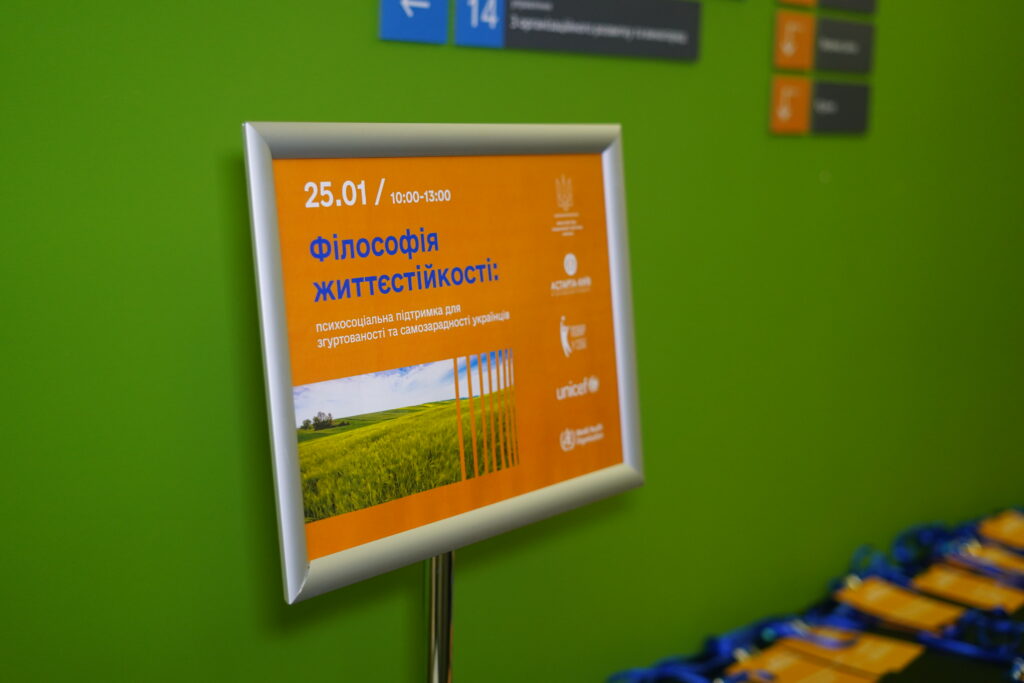
On 25 January 2024 the Ministry of Social Policy, together with its partners – Astarta, UNICEF Ukraine, the Coordination Centre for Mental Health of the Cabinet of Ministers of Ukraine, Big City Lab urban bureau and Ruban Litvinova Social Impact Agency, presented the concept of resilience and explained how the Resilience Centres will work in communities.
The focus of the Resilience Programme is on community residents. Therefore, the Ruban Litvinova Social Impact Agency conducted and presented a study to understand their needs and the overall demand for the project. The survey shows 64% of respondents (about 1,600) have low emotional well-being. However, for the majority of respondents, the ability to pay for psychological services (for themselves or their loved ones) is almost non-existent. After all, 62% of respondents can only afford food. At the same time, the need to communicate, to find a circle of those who will understand and support, is acute among different categories of citizens.
Therefore, every local community should join the project.
The role of the community in this process is to allocate and maintain premises for the service. The service provider, whose work is paid for by the state, is selected on a competitive basis.
According to Oksana Zholnovych, the Minister of Social Policy of Ukraine, communities are the key participants in the project implementation process. “If I feel confident in my community, I feel confident in my country. A hromada (community) is a point of contact between a person and the state. This face can be very different. It is not a fact that it is friendly to everyone. If we can overcome all the barriers and establish direct and friendly contact between the community and the individual through the resilience programme, we can give everyone faith in what is there, what to build, defend, and create and where to return to,” the minister said.
Besides communities, businesses and the public sector can participate in the project. Thus, the Astarta agricultural holding has already become one of the key partners in the project.
“The idea of resilience should become a Ukrainian national idea, our desire to achieve victory and recover as quickly as possible. Astarta has become a strategic partner of the Ministry of Social Policy in implementing the Resilience Programme, which is very natural for us. For more than 25 years, we have been living in the paradigm of social responsibility values and have systematic practical experience in this area. We conduct production activities, develop entrepreneurship and implement dozens of social impact projects in villages and towns almost all over Ukraine. We communicate with tens of thousands of people every day. We know their pains, needs, and expectations.
We believe in the ultimate success of this initiative and will provide methodological, expert and financial support. But the most important thing is to find and develop local leaders so that this programme can become truly vital, sustainable and self-sufficient on the part of the community itself.
I invite new partners to join the programme: businesses, NGOs, volunteers, and foundations to create such spaces in every Ukrainian community,” said Viktor Ivanchyk, founder and CEO of Astarta.
Vera Mendonsa, Deputy Representative of UNICEF Ukraine, emphasised the importance of partnership and support. She stressed that it is essential for the public sector to join the project: “If we do not support this idea now, we will lose a generation. We will not just lose a generation but the potential for our future. That is why we have also joined and are opening such spaces in 6 places in the Kharkiv region.”
The project will be implemented based on Resilience Centres. These are barrier-free and safe spaces where psychosocial support will be provided regularly to any community resident, as individual consultations, training and education to overcome the negative effects of stress. Other services will also be provided: first legal aid, consultations with employment services, support for veterans and their families, etc.
Since the only condition for community participation in the project is the preparation and provision of premises for the Resilience Centre, Victoria Titova, director of Big City Lab, presented instructions on transforming old premises into comfortable and barrier-free spaces without spending much money and effort. The team developed a manual – a guide to creating Resilience Centres – initiated by the Ministry of Social Policy and supported by Astarta. The manual is free of charge and contains recommendations on arranging spatial solutions (shelters, parking, recreation, children’s playroom, accessible toilets, etc.), taking into account the psychological comfort of visitors and the most minor details that will help make the space barrier-free.
Victoria Titova explained: “We know that similar spaces will be created in big cities and small villages. So we were looking at creating a single guide explaining how to open a space anywhere that would be barrier-free, beautiful and inexpensive to implement.”
Summarising the importance of this initiative, Oksana Zbitneva, Head of the Coordination Centre for Mental Health of the Cabinet of Ministers of Ukraine, said: “The vision of this project is the vision of the state. This is extremely important. Everyone is involved: business, the non-governmental sector, regional authorities, and communities. And we will definitely succeed. I know for sure that we will come out on top. Through resilience.”
The Resilience Programme is implemented by the Ministry of Social Policy and is part of the All-Ukrainian Mental Health Programme of First Lady Olena Zelenska.
